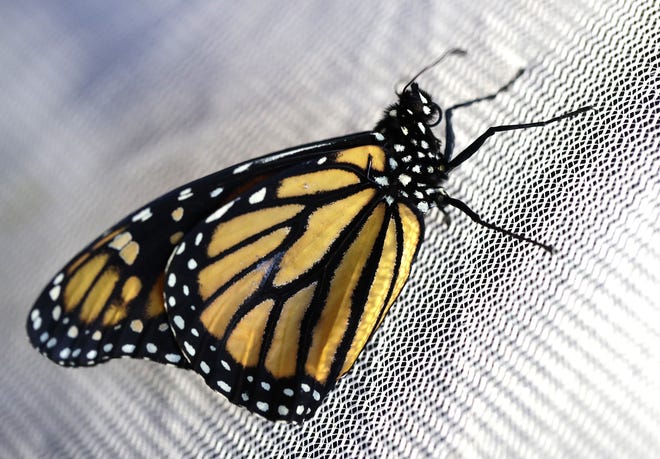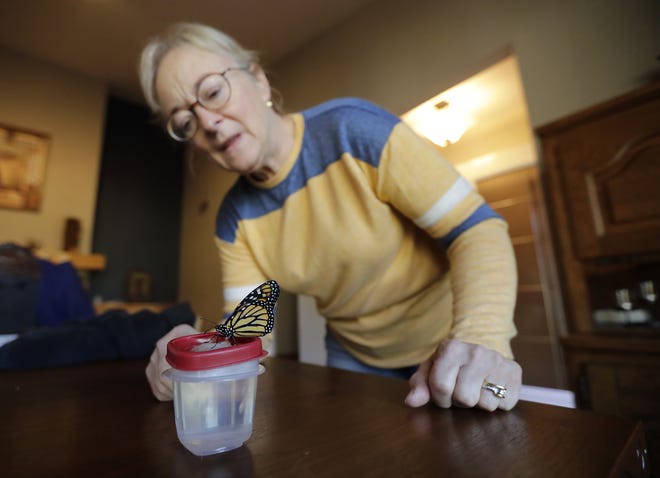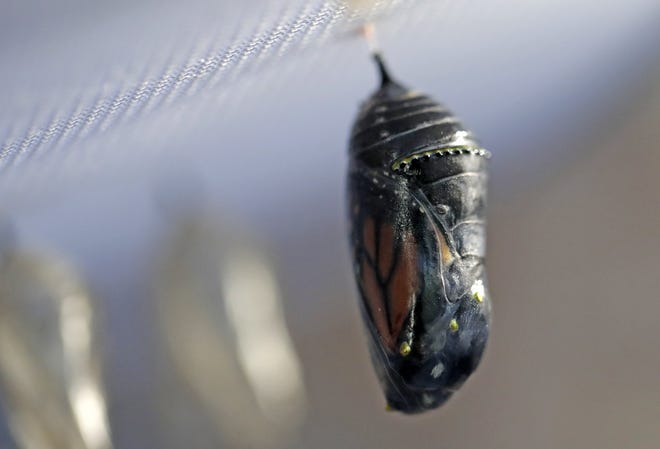DALE, Wis. – A dozen Wisconsin monarch butterflies that emerged or soon will emerge from their chrysalises two months past normal will get a big lift from FedEx.
The monarchs, neatly packaged in an insulated FedEx box, will make a 1,600-mile overnight journey from Appleton International Airport in Greenville, Wisconsin to a home in Mission, Texas, to catch up with fellow monarchs already in South Texas on their migration to Mexico.
The shipping cost $130 and was paid by Friends of Butterfly Gardens Inc.
Jack Voight, president of the nonprofit organization, said $130 is a small cost to save 12 monarchs, which otherwise would be in peril on their flight to Mexico at this time of year due to a lack of nectar along the way and the potential for freezing temperatures.
“If we can save 12 monarchs, and half the monarchs are females, each one will lay 400 eggs next spring,” Voight told The Post-Crescent, part of the USA TODAY Network. “So we’re going to increase the population. The population has gone down by 80 to 90%.”
The monarchs were found as eggs by Alicia Griebenow on her and her husband’s property in the town of Dale. Griebenow plants seven varieties of milkweed in her yard to attract monarchs. Milkweed is the only plant monarch caterpillars eat.
Griebenow’s efforts resulted in the raising and release of 204 monarchs this year.
“I was concerned early on that it was a bad year,” she said, “but it took off, and it was once again a part-time job.”
No one knows why this last generation of monarchs lingered in Wisconsin. The lifecycle from egg to adult butterfly takes about 30 days, so the female or females would have laid the eggs at the beginning of October.
Griebenow and Voight both speculated that the tardiness might be an effect of climate change. Last year, Voight also sent late-season monarchs on an overnight flight to Texas. All but one survived.
“Something’s going on,” Voight said. “More of these monarchs are now producing eggs later in the season.”
When Griebenow found the eggs in early October, she was aware of a line of thought that she should let nature take its course and leave the eggs in the elements to perish. As a monarch enthusiast, though, she just couldn’t find it in her heart to leave them and brought them inside.
The eggs soon hatched, and the caterpillars (larvae) voraciously fed on milkweed until they spun into chrysalises.
A mail theft epidemic?:Stolen checks are only the beginning, researcher says.
A rare Election Day eclipse:A total lunar eclipse is coming Nov. 8
As the monarchs emerged from the chrysalises, Griebenow fed them a solution of one part homegrown honey and eight parts water in preparation for the FedEx flight to Texas.
The monarchs were shipped in a state of torpor, as the insulated box contained a cold pack. Voight gently pinched the wings of each butterfly and carefully placed it in an envelope, then in a second envelop and then in the box. He also prepared three chrysalises for the trip.
“This is emotional for me,” Griebenow said as she watched the process. “I get into this.”
Voight said the monarchs needed an assist this late in the year. The overnight flight will cut 1,600 miles from their migration.
“Most monarchs left our area two months ago,” he said. “If we release them now, they would die because there’s not enough nectar on the way to Mexico,” where they overwinter.
The monarchs will be received by Suzanne Tilton in Mission, the home of the National Butterfly Center.
Tilton will tag the butterflies and release them in her yard, which has a lot of flowers in bloom. The hope is that they then will migrate to Mexico.
“I live less than 20 miles from the Mexican border, so the monarchs don’t have far to go from here,” Tilton told Griebenow in an email.
FollowDuke Behnkeon Twitter: @DukeBehnke.




